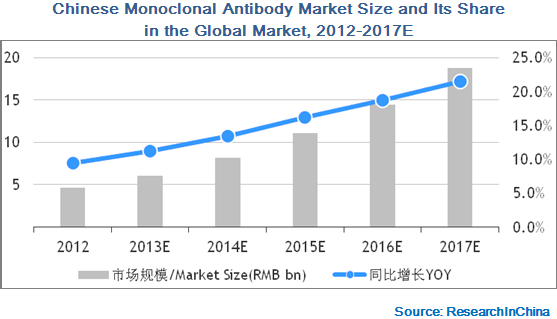Currently, monoclonal antibody agents have been successfully used in the treatment of tumors, cancers and other serious diseases as a heavyweight in the biopharmaceutical industry. In 2009-2012, the market size of monoclonal antibody agents grew at a CAGR of 13%, far higher than the overall growth rate of biopharmaceuticals in the same period. Thanks to robust market demand, approval of new products and new indications as well as launch of monoclonal antibody generic drugs, the global monoclonal antibody market size will ascend by more than 12% in 2013-2017, hitting USD141 billion in 2017.
Driven by enhanced economic level, expanded scope of medical insurance reimbursement, as well as lower prices incurred by intensified competition, Chinese monoclonal antibody market is expected to continue to grow significantly. In 2013-2017, Chinese monoclonal antibody market will grow at 35%, sharing 21.5% of the global monoclonal antibody market in 2017 (9.5% in 2012).

The global monoclonal antibody industry is still dominated by European and American companies, especially, important monoclonal antibody products are mainly produced by Roche (Genentech), Amgen, AbbVie (Abbott), Johnson & Johnson and other companies. In 2012, the global best-selling Infliximab (Johnson & Johnson), Etanercept (Amgen), Bevacizumab (Roche), Rituximab (Roche), Adalimumab (AbbVie) and Trastuzumab (Roche) stemmed from the above four companies. The global sales (including the sales of third parties) of these six monoclonal antibody agents totaled USD45 billion, accounting for 57.7% of the global.
Propelled by the optimistic market prospect, advancement of monoclonal antibody technologies and the upcoming patent expiration of several key monoclonal antibody agents, the research and industrialization of monoclonal antibody agents has become a global investment highlight, wherein the future market competition will be evident.
In September 2013, the Infliximab generic drug - Inflectra developed by South Korea Celltrion and the U.S. Hospira jointly was launched upon the approval of the EU EMA. In November 2013, the Trastuzumab generic drug developed by the U.S. Mylan and India Biocon together was available in the market under the permit of Drug Controller General Of India. Mylan will sell the product tagged with the brand name Hertraz in India in early 2014.
In addition, India Biocon's first anti-CD6 Alzumab (Itolizumab) for the treatment of chronic plaque psoriasis was approved to be sold in India in August 2013.
In recent years, China monoclonal antibody industry has been developing fast with the market size CAGR of 44.6% in 2010-2012. More than 100 companies have been involved in monoclonal antibody agents, and 10 ones of them have conducted clinical applications. The Chinese market is dominated by Rituximab, Trastuzumab, Infliximab, Bevacizumab and other imported products, all of which occupied 70-75% market share totally in 2012.
However, by virtue of price and geographical advantages, the competitiveness of Chinese local monoclonal antibody products has been gradually improved, such as the competition between Nimotuzumab and Cetuximab. The market share of Merck's Cetuximab in China shrinks and was excluded from top 200 drugs purchased by Chinese 22 typical urban hospitals in 2012 with the value of RMB130 million (down 16.35% year on year).
Meanwhile, the R & D of monoclonal antibody has also made progress. The Adalimumab generic drug developed by Huahai Pharmaceutical and American Oncobiologics jointly was ratified by the EU EMA and the U.S. FDA in December 2013 and the clinical trial Phase I was implemented. The Trastuzumab generic drug of Genor Biopharma was granted with Australian Clinical Preliminary Summary Report Phase I in August 2012 and SFDA's clinical trial approval in July 2013.





